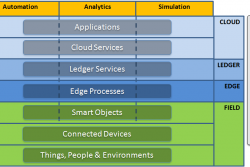H2020 FAR-EDGE Project: Where Factory Automation meets Edge Computing and Blockchain Technology
The FAR-EDGE (http://www.far-edge.eu) H2020 project (GA No. 723094) is a joint effort of leaders in industrial automation, cyber-physical systems (CPS) for manufacturing and the Industrial Internet-of-Things (IIoT) towards providing a novel edge computing solution for the virtualization of the factory automation pyramid. For over a decade, several initiatives have introduced decentralized factory automation solutions based on various technologies including intelligent agents and Service Oriented Architectures (SOA). With the advent of the Industrie 4.0 such solutions are revisited in the light of the integration of Cyber-Physical Systems with cloud computing infrastructures. However, early implementations have also revealed the limitations of the cloud in terms of efficient bandwidth usage and its ability to support real-time operations. In order to alleviate these limitations edge computing architectures have recently introduced. They introduce layers of edge nodes between the field and the cloud, as a means of: (i) Saving bandwidth and storage; (ii) Enabling low-latency and proximity processing; (iii) Providing enhanced scalability based on decentralized data processing; (iv) Supporting shopfloor isolation and privacy-friendliness. These benefits make edge computing suitable for specific classes of use cases in factories, including large scale distributed applications that involve multiple plants and near real-time applications which analyze data close to the field or even control CPS such as smat machines and industrial robots. . FAR-EDGE researches and explores the application of the edge computing paradigm in factory automation, through designing and implementing reference implementations in-line with recent standards for edge computing in industrial automation applications. FAR-EDGE is not the sole effort that focuses on a general-purpose architecture and on an associated reference implementation of an edge computing platform for factory automation. Several other initiatives are exploring similar directions. These include: 1) Standards Development Organizations (SDOs): SDOs such as the OpenFog Consortium and the Industrial Internet Consortium (IIC) have produced Reference Architectures (RA) for industial IoT use cases, which prescribe edge computing principles in terms of their implementation. 2) Reference Implementations: A reference implementation of the IIC RA’s edge computing functionalities for factory automation is provided as part of IIC’s edge intelligence testbed. Moreover, Dell-EMC has recently announced the EdgeX Foundry, which is a vendor-neutral open source project hosted by the Linux Foundation building a common open framework for Industrial IoT edge computing. The FAR-EDGE architecture is aligned to the IIC RA, while exploiting concepts from other RAs and standards such as the OpenFog RA and RAMI 4.0 (Reference Architecture Model Industrie 4.0). The project will be providing one of the world’s first reference implementation of edge computing for factory automation, similar to IIC’s edge intelligence testbed and the EdgeX foundry. Note however, that FAR-EDGE will be exclusively focused on factory automation, rather than being inspired from a broader set of industrial use cases, as is the case with the rest reference implementations. Beyond its functional uniqueness, FAR-EDGE is also unique from a research perspective. In particular, the project will research the applicability of disruptive distributed computing technologies for IIoT (i.e. the blockchain) as a means of configuring and deploying edge analytics and automation functionalities in a scalable and secure way. In particular, FAR-EDGE will provide a proof-of-concept implementation of a blockchain mechanism for sharing state nd reconfiguring analytics rules and automation workflows in factories. This is among the project’s unique research contributions, which essentially sets it apart from other edge computing efforts worldwide.
Keywords
Industry 4.0, H2020, edge computing, automation, blockchain
Countries
Switzerland, Germany, Greece, Italy, Portugal, Sweden

